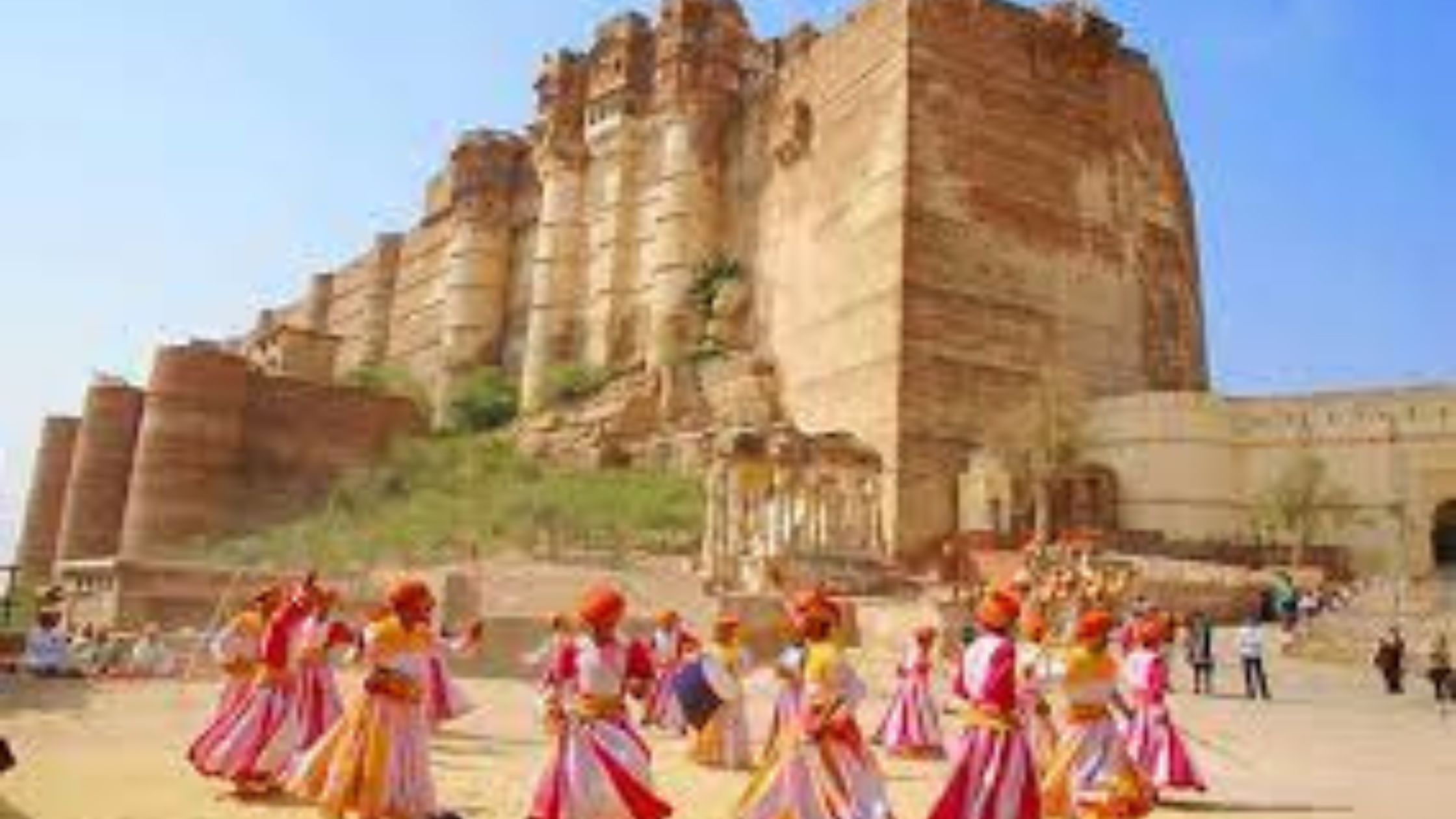The Marwar Festival’s Performances and Costumes
The Marwar Festival event is a celebration of folk art, music, and dance, the performers’ colourful costumes are given top priority. They are Rajasthani traditional costumes that are an important part of every performance. In addition to the one-of-a-kind costumes, the event features a series of traditional performances, as is customary.
Here are some of the most well-known:
1.Dandi Gair is number one.
This is a variant of the popular Gair dance, which is a classic Rajasthani folk dance performed by the Bhil tribe. This dancing genre is enjoyed by both men and women, and it is one of the festival’s main attractions.
The women are dressed in bright-coloured skirts that are matched with equally brilliant coloured blouses, and they have dupattas (long veils) wrapped on their heads that flow towards the back, as previously said. During the circular dance manoeuvres, the guys wear bright red tunics that flow out into flared skirts, providing a unique look. This is paired with saffron-coloured turbans and crimson traditional churidar pants.
2. Kalbelia
Another festival highlight that should not be missed is the Kalbelia dance, which is historically performed by the region’s snake charmer population. The women celebrate their unique livelihood by dancing while pretending to be attracted by the snake charmer males and imitating snake-like movements.
The ladies are dressed in black lehenga cholis, as is customary. However, a variety of eye-catching decorations, such as those in brilliant red, yellow, and green, provide a particular sheen to their outfits. Other sparkling decorations, which are embellished with traditional ‘gota Patti craftsmanship, produce a mirror appearance. A variety of silver jewellery and enamel bangles are also worn by women. Long shirts that fall below the waist are worn by the men, who are frequently paired with traditional dhoti bottoms.
3. Ghoomar is number three.
The main attraction of the Marwar festival is one of Rajasthan’s most prominent dance forms, which has been represented on film and is emblematic of the event. The name ghoomar means ‘to whirl,’ which perfectly fits the dancing form. The main beauty of the dance is in the flare of the large and colourful skirts of the women that shimmer with light when light falls on the flared skirts embellished with shining gold and silver embroidery, despite the fact that it appears to be a simple dance form that consists of stepping in repeated circular patterns. The women were also wearing bright glass bangles, which are a big feature of the holiday.
Bhavai and Chari are two more prominent dance genres. Bhavai is a gymnastic dance form in which ladies balance great quantities of glassware and swords on their heads. Chari honours the lives of women in Rajasthan’s desert as they express their long search for drinking water in the parched land through dance, holding brass pots on their heads that glitter as they dance.
Marwar Fair has a lot of things to buy.
The Marwar fair is the perfect place to sample some of Rajasthan’s finest handicrafts and traditional antiques, including unusual jewels and traditional jewellery, as well as traditional coloured kurtas, sarees, suits, and Kurtis for ladies.
The bright bandhani tie-dye dupattas and turbans that abound at the market are an iconic form of print. The festival also sells knickknacks and artefacts for home décor and souvenirs. Many modern versions of traditional apparel are available at the fair these days, thanks to fusion fashion, which is a big draw for the fashion-forward youth.
What is the best way to get to the Marwar Festival?
The festival’s two days see the city of Jodhpur at its busiest, so it’s best to arrive early to avoid the crowds. Jodhpur is well connected to major Indian cities such as Delhi, Mumbai, Kolkata, Udaipur, and Jaipur, with frequent direct flights.
Driving from any of the major Rajasthani cities such as Jaipur, Jaisalmer, Bikaner, Udaipur, and Ajmer will take you to Jodhpur. There are also direct buses to and from Jodhpur from Delhi, Ahmadabad, and Agra.
Jodhpur is well-connected to all major cities by train, as it is part of the North-Western Railways. Trains go directly from major cities such as Jaipur, Delhi, Mumbai, Kolkata, and Bangalore. The popular royal carriages Palace on Wheels and Maharajas’ Express run in this direction as well, stopping in Rajasthan’s Blue City. If you are in jodhpur you can book a taxi in Jodhpur to attend Marwar fair festival.

